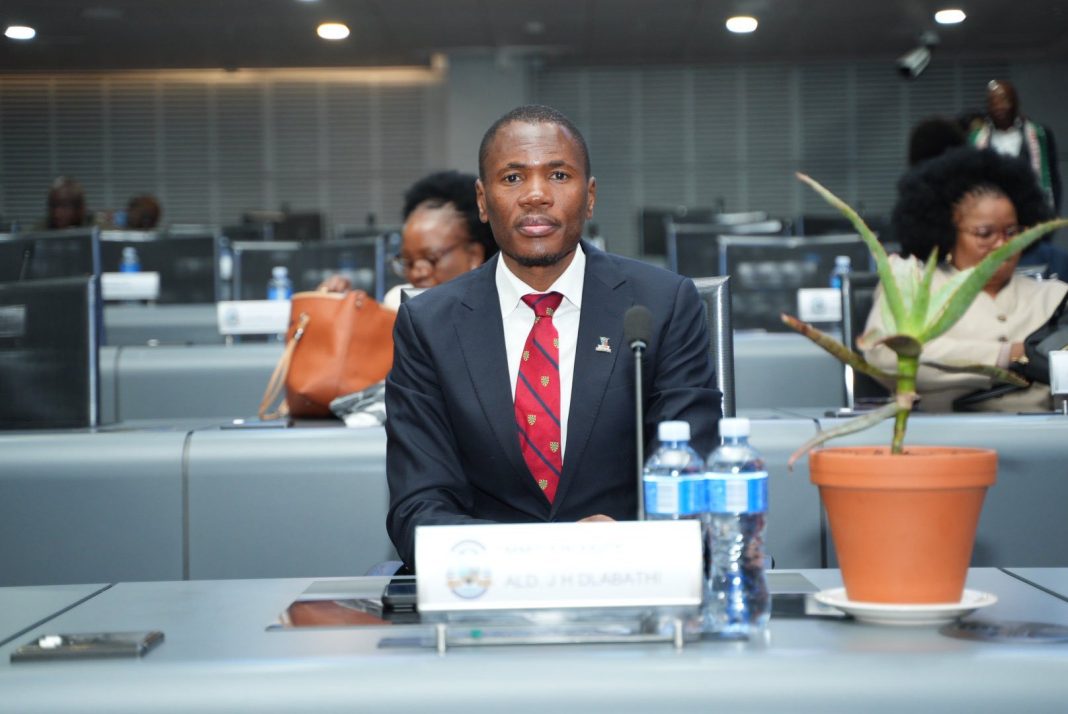By Johnathan Paoli
The City of Ekurhuleni has unveiled a R65.5 billion budget for the 2025/26 financial year, focusing on restoring service delivery, strengthening internal capacity, and driving economic development.
Delivered by the MMC Finance, Strategy, and Corporate Planning, Jongizizwe Dlabathi, the budget is framed around six key developmental pillars and underpinned by a commitment to realistic planning and fiscal discipline.
“From the outset, we seek to present a realistic budget outlook that can be practically implemented and monitored, taking into consideration the current state of our City’s environment,” said Dlabathi.
Dlabathi, highlighting the importance of community input and accountability under the theme: “The People Shall Govern”; described the city’s developmental agenda as built around six interlinked pillars namely the provision of quality and sustainable services; rebuilding a strong financial base; and maintenance and repair of public infrastructure.
Additionally, the agenda will be built on investment in critical infrastructure through partnerships; economic development and job creation, especially through the Aerotropolis strategy and manufacturing revival; and upholding ethical governance and institutional performance.
The MMC said that these priorities aim to restore basic municipal functions, improve efficiency, and enhance long-term sustainability.
The budget places service delivery at the forefront, targeting consistent electricity and water supply, reliable sanitation and waste collection, stormwater management, and the urgent repair of potholes, traffic lights, and public lighting.
Human settlement development and anti-corruption efforts are also key focus areas.
Acknowledging severe financial constraints, Dlabathi noted ongoing challenges such as revenue leakages, poor liquidity, and under-collection.
The city must raise 90% of its revenue internally, despite increasing demand on its limited resources.
A “difficult balancing act” was required to prioritise essential services without compromising the city’s development trajectory.
Still, there are encouraging signs, Moodley affiliated GCR Ratings recently revised the city’s outlook from negative to stable due to improved fiscal management and reduced debt.
Ekurhuleni’s economy, heavily reliant on logistics and manufacturing, continues to recover slowly from the downturn.
The 2024 unemployment rate declined slightly to 36.9%, but the city still faces the highest unemployment among Gauteng metros.
The Gauteng Treasury’s outlook anticipates growth, conditional on resolving energy constraints, ramping up infrastructure investment, and cultivating a business-friendly environment.
To boost revenue, the city will enhance credit control, reduce billing inefficiencies, and implement a revenue enhancement strategy targeting an additional R2.1 billion.
Talks are underway to introduce wayleave charges for companies installing infrastructure, and explore service contributions from informal settlements and hostels.
Key tariff changes include 0% increase in property rates, burial, and municipal bus tariffs and a 10% rise in sanitation charges to address wastewater plant constraints.
Additionally, Dlabathi confirmed a 15% increase in water tariffs, reduced from the initially proposed 17%; a 6% increase in refuse removal tariffs; electricity tariffs in line with NERSA guidelines; and a 4.3% increase in sundry fees.
In a major win for residents, the city will abolish the R1,500 stolen cable reconnection fee effective from the beginning of June.
The MMC highlighted the operational budget as a reflection of the decisive shift from outsourcing to internal capacity building.
The employee compensation budget has increased from R11.7 billion to R13.4 billion, enabling the hiring of 700 permanent cleaners and 290 EMPD officers.
An additional R303 million is earmarked for tools and productivity enhancements.
A 50% cap on overtime remains in place, with only essential service departments allowed exceptions.
Repairs and maintenance spending rises to R3.5 billion, 6.63% of total assets, with a goal of reaching the National Treasury’s 8% benchmark.
Dlabathi maintained that the city’s priorities include R1.4 billion for energy upgrades; R946 million for road and stormwater repairs; and R550 million for water and sanitation maintenance.
Further more, R226 million will be allocated for environmental services, including grass cutting and cemetery upkeep; while R54 million will be earmarked for sinkhole repairs, with acknowledgment that this is below actual needs.
The R3.1 billion capital budget, up 14.2% from last year, addresses infrastructure backlogs.
R1.04 billion will be allocated to improve electricity supply and reduce losses; R757 million for water and sanitation infrastructure; R491 million for housing, including mega projects and hostel upgrades; and R550 million for roads, bridges, and stormwater systems.
The MMC said that R255 million will be allocated for landfill compliance and waste vehicles; R100 million for the city’s ERP digital transformation system; and R36 million for EMPD equipment and fleet.
Municipal entities such as the Ekurhuleni Water Care Company and the Ekurhuleni Housing Company will receive R300 million to enhance self-sufficiency and reduce dependency.
Dlabathi admitted to delays in paying service providers, especially SMEs, due to cash flow challenges.
The city plans to expedite invoice payments and offer structured arrangements to restore confidence among vendors.
Proposed policy amendments include 10 kl free water for approved indigents and 6 kl for deemed indigents; property value threshold for indigents set at R600,000; and no disqualification for owning two properties.
Furthermore a 75% debt write-off will be implemented for households (up from 70%) and 10% for businesses, with 100% interest relief.
A meter tampering amnesty will be extended until 30 September; while free rates clearance will be facilitated for deceased accounts under application.
To attract investors, the city will offer bulk infrastructure rebates, expedited approvals, and flexible zoning, overseen by the Investment Clearing Committee.
Dlabathi closed by thanking city leadership and stakeholders for their support.
“I thank all the Political Parties within the Collaborative Government for shaping the budget we are presenting today. I also express appreciation to other political parties who made positive and helpful submissions in the spirit of wanting to see progress,” he said, calling on residents to actively participate in governance and service delivery initiatives.
The public has until 25 June to object to the new property valuation roll and engage with the city’s ongoing budget processes.
INSIDE METROS

